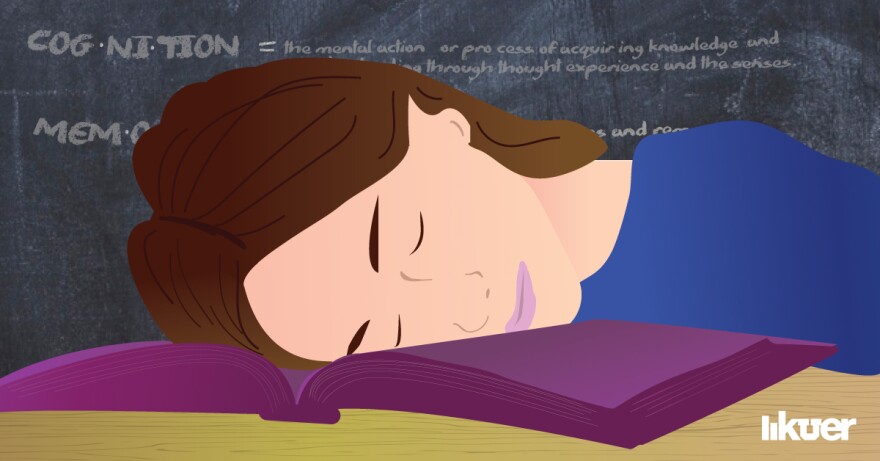It’s 6:30 a.m. on a recent weekday morning, and Caroline Keeney is trying to get her two teen daughters ready for school. She knocks on the door of her younger daughter, Eden, and the 13-year-old middle schooler jumps right out of bed.

It’s not as easy with 16-year-old Quinn, who groans when she hears her mother knocking on her door.
Quinn is a junior at Highland High School in the Salt Lake City School District, where school starts at 7:45 a.m. She tries to go to bed around 10 p.m. so she can get a good night's rest, but she says her brain is usually too hyped up to sleep then.
“I’ve talked to a lot of my friends who say they can’t go to sleep until after 10 too,” she said. “I think it’s just hard for some reason.”
Without a good night’s rest, Quinn struggles to get up in the mornings for school. It’s also hard for her to focus in her first class

Nationwide, the average school start time is 8:10 a.m., according to the National Center for Education Statistics. But physician groups, health advocacy groups, think tanks and even the Centers for Disease Control and Prevention support school start times of 8:30 a.m. or later.
The Salt Lake City School District’s board is looking at the impact of pushing back start times for its high schools by at least 30 minutes. Studies show more sleep can improve students’ academic performance as well as physical and mental health.
A 2014 study that focused on students in Fairfax County, Virginia, found suicide attempts by students increased by 58% with each hour of sleep lost.
Katherine Kennedy, who sits on the school board, said this is why she supports later start times. She’s also supporting a resolution by state Rep. Suzanne Harrison, D-Draper, that asks schools to consider changing when their first bell rings.
“It seems to me that it's crucial for us to save our children if we have the chance to save them,” Kennedy said.
The Keeneys, however, aren’t sold on the late start idea. The two daughters worry that a later start would cut into their busy after school schedule of skiing, swimming and track practice.
“I just find it frustrating …” Quinn said. “Even though you have more time to sleep in in the morning, you’re at school later, at sports practice later, and then you are home later, starting homework later, eating later."

For their mother Caroline, a later start would make it impossible for her to drop off her daughters at school before she starts work at 8 a.m.
“I do agree they need sleep. I’m not sure I can provide them that benefit of it if we’re leaving the house before they do,” Caroline said.
But other parents appear to be supportive. A recent district survey of nearly 1,000 parents found that around 80% support the idea. At a Jan. 16 community meeting, many parents spoke in favor of a later start time, including Srikanth Jammulapati.
“No amount of putting money into education is going to help if the child is not awake to learn,” Jammulapati, the father of a West High School student, said.
A Nationwide Conversation
The idea of later starting times is getting a foothold around the country. A new California law passed last year will prohibit most middle schools from starting earlier than 8 a.m. and most high schools from starting earlier than 8:30. In Ohio, a lawmaker introduced similar legislation in October.
The movement began to pick up in 2014, said Andra Broadwater with Start School Later, a national coalition of parents, educators, students and health experts. That’s when the American Academy of Pediatrics published a report that recommended delayed start times for middle and high schools. Teens are not biologically programmed to fall asleep early, the report found.
“Teens aren’t being lazy,” Broadwater said. “They really truly need the sleep to grow.”
A Domino Effect
Historically, schools used to start around 9 a.m., Broadwater said, but that changed in the 1970s amidst a global oil crisis.
That system required shifting start times for elementary, middle and high schools to earlier in the morning — creating the start times and tiered busing system that most schools use today.
Now, schools that want to shift start times face another shortage: bus drivers. Changing schools’ current bus routes is also costly. That’s partially what kept Park City School District from moving its start times more than two years ago.
At the Salt Lake City School District, parents are also concerned about the domino effect later start times will have on transportation and start times for elementary and middle school students. About 12% of parents, likely from low income and Hispanic backgrounds, are opposed to later school start times, according to the district’s survey.
Utah's Efforts

Jordan School District has found one solution that offers a later start and flexibility: online classes. Superintendent Anthony Godfrey recently announced that starting fall 2020, juniors and seniors can attend two of their classes online. Participants would start class at 9 a.m. instead of 7:30, like other students, but the school district would not provide transportation to school, Godfrey said.
At the state level, Rep. Suzanne Harrison, D-Draper, is pushing a resolution, HCR 3, that asks Utah school districts to consider later start times and look at ways to implement the change. During a Health and Human Services Committee meeting, Harrison acknowledged that each school district may decide to approach the late start idea differently, but it’s worth considering.
Harrison’s resolution passed out of the House Monday in a 51-20 vote. It’s now headed to the Senate. Meanwhile, the Salt Lake City school board is expected to continue the late start conversation at their next meeting.
Editor’s Note: State Rep. Suzanne Harrison sits on KUER’s advisory board.

